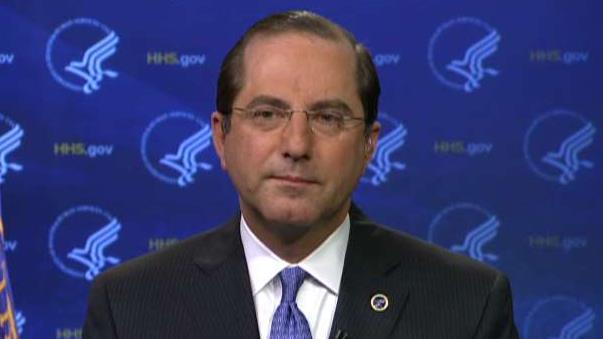Trump's drug price plan mixed bag for benefit managers
The White House is proposing several policy shifts that would further solidify the role of pharmacy benefit managers in setting drug costs, stunning some in the health care industry who view it as a direct contradiction to President Trump's stated goal to eliminate the middleman price negotiators.
The actions to-date highlight the difficulty in trying to implement sweeping changes to an opaque and complicated system that involves several players -- including drug companies, insurers and pharmacy benefit managers (PBMs) like Express Scripts and CVS Health -- where small shifts in policy are almost certaintly advantageous to one participant at the expense of another. Still, critics say the intense public criticism of PBMs from Trump, Health and Human Services Secretary Alex Azar and others has not matched the reality of the overall agenda.
“I think the rhetoric is overblown. It’s overblown and unfair,” J.C. Scott, CEO of the PBM industry’s trade group Pharmaceutical Care Management Association, told Fox Business. “HHS clearly recognizes the importance of having an entity like the companies that we represent.”
Azar has said as much, telling Bloomberg recently that "pharmacy-benefit managers do an incredible job negotiating discounts, rebates in our system." Still, when rolling out his broad vision for lowering drugs cost Trump said his administration was "very much eliminating the middlemen.”
The reality is more complex and involves changes to complicated federal policy that often flies under the public radar.
Last year, for example, the administration proposed allowing health plans to no longer have to provide coverage for drugs in the so-called “protected class,” or those treatments that Medicare has for over a decade been required to offer to all beneficiaries. The policy, critics say, allowed pharmaceutical companies to hike the cost of drugs for cancer, depression, HIV and other diseases well above inflation, given private plans had to provide access for Medicare Part D enrollees.
Opponents say the shift could allow plans to discriminate against certain conditions, while supporters say it allows for greater competition among equivalent products -- ultimately leading to lower prices for consumers.
The one takeaway that both sides can agree: Pharmacy benefit managers become more powerful.
“That does create more negotiating leverage,” Cowen senior analyst Charles Rhyee said.
| Ticker | Security | Last | Change | Change % |
|---|---|---|---|---|
| CI | THE CIGNA GROUP | 294.40 | +2.35 | +0.80% |
| CVS | CVS HEALTH CORP. | 75.77 | -2.58 | -3.29% |
| UNH | UNITEDHEALTH GROUP INC. | 275.70 | -0.95 | -0.34% |
The administration is also allowing Medicare plans to require that patients try cheaper, potentially less effective drugs before progressing to the costlier, physician-administered infusion treatments – which are also more lucrative in terms of reimbursement for pharmaceutical companies.
Critics say the policy shift – known as step therapy -- could mean patients are delayed in receiving the best treatments for them, particularly those who may switch to a new insurer and are forced to begin again at the most affordable drug even if it did not work previously. Ultimately, it gives insurers and PBMs greater leverage in negotiations with drugmakers, another move to empower the very industry Trump promised to eliminate.
The administration says it is working across the spectrum to increase price negotiation in Medicare, align U.S. costs with the cheaper prices that European countries pay and eliminate the complicated rebate system that can lead to higher list costs for treatments.
“President Trump and Secretary Azar remain committed to lowering drug prices and reducing out of pocket costs for American patients and will continue to take bold action to restructure this broken market," an HHS spokeswoman told Fox Business in an emailed statement.
To lower prices for consumers, the White House is taking one major swipe at the pharmacy benefit managers by proposing to eliminate by 2020 the rebates the industry negotiates with drugmakers that pad profits and are also passed along to consumers
The draft rule released last month won acclaim from top pharmaceutical companies, but the proposal lacks significant details – igniting concern among PBMs, insurers and even drug manufacturers that the administration may be rushing forward with a sweeping change without understanding the ramifications.
CLICK HERE TO GET THE FOX BUSINESS APP
Still, it was a welcome sign for those hoping Trump would follow through on his rhetoric and target PBMs.
Every other proposal “would have played toward the strength of the payor or the plan as it relates to negotiations with biopharmaceutical companies,” said Lance Grady, managing director at health care consulting firm Avalere.
“Many people thought that the administration -- if they had not brought out the elimination of rebates -- could have potentially painted themselves in a corner with, in essence, moving all of the negotiating chips to the plans and PBMs,” he added.




















